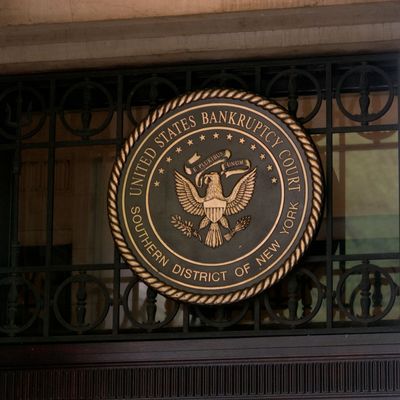
Before Sam Bankman-Fried’s crypto empire went bankrupt last month, another crypto hedge fund called Three Arrows Capital met a similar fate, filing for bankruptcy in early July. Since then, the founders of 3AC, Su Zhu and Kyle Davies — who had gone to an elite boarding school in Massachusetts and attended Columbia University — had largely disappeared and were assumed to be in hiding. The only interview they gave was from an “undisclosed location,” and their own liquidator said it had not been able to reach them even to serve them legal documents.
But exactly 40 minutes after Bankman-Fried’s FTX collapsed, announcing a deal to be acquired by rival Binance (one that never came to fruition because FTX filed for bankruptcy), they resurfaced. “Gm,” Zhu tweeted in reply to an old acquaintance, which means “good morning” in crypto-speak.
Since then, Zhu and Davies have been staging something of a comeback campaign on Twitter, arguing that they and Three Arrows Capital were actually victims of Bankman-Fried’s and FTX’s misdeeds. Both have been regularly tweeting, acting as if the collapse of their firm — which wiped an estimated $1 trillion from the crypto market and evaporated billions of dollars of creditors’ money, as I detailed in a cover story in August — were merely an opportunity to take a sabbatical.
“So what have I been doing?” Zhu wrote in a Twitter thread the same night of FTX’s downfall. “Catching up w long lost friends,” “redeveloping spirituality, mental health,” “surfing,” “learning new languages.”
Davies, for his part, tweeted a few days later that he’d been spending his time with “more grass and painting,” posting a self-portrait of himself looking much more tan, blond, and unshaven than usual, as if he’d been hanging out at the beach. Shortly thereafter, on November 16, he appeared on CNBC, where he said he was in Bali. He seemed to rebut the liquidators’ assertion that he’d been avoiding them. “Every call, every email, every video we’ve attended with them,” Davies said in the interview. “So, I mean, frankly, we’ve been cooperating the whole way.”
But in a new hearing in a U.S. bankruptcy court in the Southern District of New York on Friday — which neither Zhu, Davies, nor their lawyers attended — 3AC’s liquidators threw cold water on the founders’ claims. The liquidators reiterated that, of the $3 billion in claims creditors have filed, only some $35 million in cash has been recovered, plus more than 2,000 NFTs of unknown value. (Reached for comment, Zhu said that the choice not to engage with the liquidators is related to their attempts to “vilify” him and Davies and that they plan to go directly to creditors with an alternate plan.) Here are a few more surprising revelations from the court proceedings.
Davies lied to CNBC about 3AC’s cooperation.
Despite Davies’s assurance to CNBC that he’d been in constant cooperation with 3AC’s liquidators, he and Zhu met with them a single time — and not since August, according to a timeline presented to the court. Zhu and Davies have made only “cursory disclosures of assets and certain agreements,” the liquidators said in their presentation, and failed to turn over Three Arrows Capital’s books and records.
It’s especially odd, the liquidator noted, considering it was Zhu and Davies themselves who had originally petitioned to liquidate Three Arrows Capital. “In those sorts of circumstances, our expectation would be effectively full and immediate cooperation from the company, its principles, and its investment manager,” Russell Crumpler, a director at Teneo, the firm serving as 3AC’s liquidator, testified during Friday’s hearing. That “has simply not occurred,” he added. “And we have therefore had to effectively re-create the company and the records of the company as best we can from scratch.”
A lawyer for the liquidator, Adam Goldberg of Latham & Watkins, who is seeking to subpoena Zhu and Davies to force them to turn over materials, said, “Quite frankly, it is the liquidators’ position that the founders have failed to engage in delivery of information and assets required by their duties to creditors.”
3AC’s founders had “something to hide.”
While the liquidators had over the summer released photographs from their visit to 3AC’s old Singapore offices, showing mail piling up outside a locked door to an empty office, on Friday they provided an update about what was happening inside as the firm went under. In the middle of June, as Three Arrows Capital collapsed, it hired a security firm able to “establish a secure communication system that could then allow those communications to be deleted,” Goldberg told the court.
When the liquidators were finally able to get into the office, they found evidence of “ransacking of hard drives,” with most records and drives removed from the building and its computers. “The liquidators’ position is that the founders’ behavior shows they have something to hide,” Goldberg added. “The founders have caused the investment managers to conceal and withhold information as well.”
Three Arrows used company money to buy a superyacht called Much Wow.
New York reported that Zhu and Davies had purchased a $50 million Sanlorenzo superyacht they dubbed Much Wow. The liquidators now say 3AC made initial payments for the yacht with “multiple transfers” of company funds. That fact was disclosed in a slide presented to the court titled “Founders’ Improper Conduct.”
The yacht has since been sold, the liquidator confirmed for the first time. And the Three Arrows estate has filed a claim to recoup $30 million of the proceeds from Much Wow’s sale.
Lawyers aren’t buying the claims from Zhu and Davies that FTX took down 3AC.
Since resurfacing immediately after FTX collapsed, Davies and Zhu — despite facing public accusations of fraud themselves — have encouraged a narrative that they were victims of Bankman-Fried. “Its a long story but we were scammed just like you guys, its ok –justice is coming,” Zhu replied to a tweet asking why 3AC traded so much on FTX. “We understand now that FTX/Alameda hunted our positions,” Davies tweeted recently.
After silence since July, the “frequency” of Zhu’s and Davies’s tweets “has increased dramatically since the FTX issues have come to light,” Crumpler, the liquidator, told the court. They now tweet “on a more-than-daily basis,” he added.
Those tweets have mostly involved either making or retweeting accusations against Bankman-Fried and FTX, plus a few vicious subtweets. “Polycule ngl sounds like a decent name” for a hedge fund,” Zhu tweeted November 18.
In the hearing Friday, Goldberg pointed out that Zhu and Davies’s apparent defense strategy — shifting blame to FTX for their own failure at Three Arrows Capital — seemed a bit too convenient. “It’s interesting, to say the least, that the first time we’ve heard this theory that FTX caused the downfall of this debtor was after FTX’s own sensational collapse,” he said.
Goldberg then presented a slide full of tweets by Zhu and Davies about FTX, calling for “transparency” from Bankman-Fried. (“The time for the truth to surface is now,” Zhu wrote in one from November.) “I’d like to conclude this PowerPoint presentation by demonstrating some of the most brazen and, for the creditors of this debtor, painfully ironic messages that the founders have been issuing via Twitter calling upon FTX and Sam Bankman-Fried to reveal the truth,” Goldberg explained. “Put simply, Your Honor, the founders should heed their own calls and reveal the truth in this proceeding. The liquidators are left with no choice but to seek to compel them to provide that.”
It may be impossible to subpoena Zhu and Davies — much less extradite them.
Part of the lawyers’ reason for emphasizing how active Zhu and Davies have been on social media was to persuade the judge to let them serve the founders subpoenas “by Twitter,” though it was unclear how that would work (does one just DM them?). The liquidator had already noted that even Zhu and Davies’s lawyers had been refusing to accept service of legal documents on their behalf. One of the liquidators’ lawyers described “a deliberate pattern of evasion by the founders and the entity they control, the management entity of Three Arrows.” (The liquidators’ legal team also brought up the possibility of holding Zhu and Davies in contempt of court.)
But while the judge agreed that Zhu and Davies were active on Twitter, he wasn’t sure he could enforce such a subpoena, which made him “reluctant to authorize” it. No one in the hearing seemed to be aware of any other U.S. cases in which subpoenas had been delivered on Twitter.
Another problem is that Zhu and Davies are no longer U.S. citizens after relinquishing their American passports in order to become citizens of Singapore in the past few years. Because they’ve been spending their time between the United Arab Emirates and Indonesia — “jurisdictions known for difficulties in enforcing foreign court orders,” according to the liquidator’s presentation to the court — it may not be possible to subpoena, let alone extradite, them.
The judge said he was “not satisfied” with the evidence the liquidators presented that it would be “an enforceable order” if he did allow Zhu and Davies to be served via Twitter. The lawyers promised to come back with additional evidence.
On Saturday, Davies tweeted a statement accusing the liquidators of making “extravagant allegations against us.” “We invite the Liquidators to engage us positively, constructively, and without threats,” the statement continued, though it did not specify what threats had been made.






























